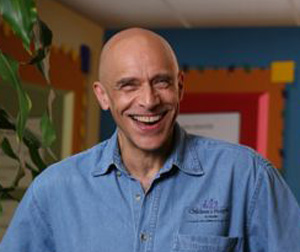Top physicists from around the world will gather at the University of California, Santa Cruz, on June 15 and 16 for a symposium in honor of two eminent theoretical physicists: Thomas Banks, professor of physics at UCSC, and Willy Fischler, professor of physics at the University of Texas, Austin.
Banks and Fischler, who are being honored on the occasion of their 60th birthdays, have been influential thinkers on a broad range of topics in theoretical physics, both individually and in collaboration with each other and with other physicists.
"Their impact on the field is reflected in the people who are coming to the symposium--it is a very distinguished group," said Michael Dine, professor of physics at UCSC and chair of the committee organizing the symposium. The speakers will include two Nobel Laureates and five MacArthur Fellows.
The development of string theory, an ambitious attempt to find a unified theory of the forces of nature, is one area in which Banks and Fischler, as well as many of the speakers at the symposium, have made important contributions. The first proposal for a complete formulation of string theory was presented in a widely known paper published in 1997 by Banks, Fischler, Stephen Shenker, and Leonard Susskind. Known as the Matrix theory, it gave rise to many later developments, according to Nathan Seiberg of the Institute for Advanced Study in Princeton, N.J.
"In that sense, it was very important," Seiberg said. "But these two individuals have had an enormous impact on the field, and to focus on that one contribution would give an oversimplified impression of their impact. The range of their contributions is really unusual."
Susskind, the Felix Bloch professor of physics at Stanford University, said both Banks and Fischler have been major presences in almost all aspects of theoretical high-energy physics for the past 30 years. "Everybody who knows the subject would consider them two of the great leaders of theoretical physics, both in their own work and by inspiring others with their ideas," he said.
Banks and Fischler have done important work in areas such as the physics of black holes, particle physics, quantum gravity, and quantum field theory. Banks has written a new textbook on quantum field theory (Modern Quantum Field Theory: A Concise Introduction, Cambridge University Press, 2008), which Seiberg said is destined to become a classic.
"Tom Banks is one of the best teachers in the field. If I have a question, I come to Tom and I get an answer--he's like an encyclopedia," Seiberg said. "I am proud to have been his student as an undergraduate, and throughout my career I have learned an enormous amount from him."
The title of the symposium is "Confronting Challenges in Theoretical Physics," and speakers will address the latest developments in many of the areas in which Banks and Fischler have done important work.
"Although the talks will reflect the work they have done, it won't be retrospective. The idea is for people to lay out their visions for where the field is going," Dine said.
Seiberg and Susskind will be among the speakers. Others will include David Gross of the Kavli Institute for Theoretical Physics at UC Santa Barbara; Steven Weinberg of UT Austin; and many other leading theoreticians. Abraham Seiden, director of the Santa Cruz Institute for Particle Physics at UCSC, will discuss new experimental results expected from projects such as the Large Hadron Collider.
A complete program is available on the symposium web site.
Note to reporters: You may contact Dine at (831) 459-3033 or dine@scipp.ucsc.edu.




